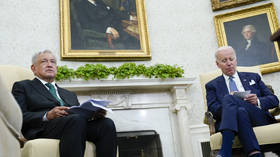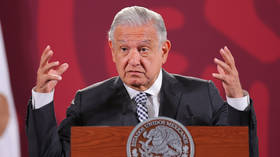Mexican president makes Assange appeal to Biden

The president of Mexico has revealed the contents of a personal letter he passed on to his US counterpart during their meeting last week. Andres Manuel Lopez Obrador urged Joe Biden to intervene and dismiss charges against WikiLeaks co-founder Julian Assange, who faces the prospect of 175 years in an American prison.
“I left a letter to the president about Assange, explaining that he did not commit any serious crime, did not cause anyone's death, did not violate any human rights and that he exercised his freedom, and that arresting him would mean a permanent affront to freedom of expression,” Lopez Obrador said at a news conference on Monday.
“And I explained to [Biden] that Mexico offers protection and asylum to Julian Assange,” the Mexican president added.
It’s not the first time the Mexican leader has made a plea on behalf of Assange. Earlier this month he said that if Washington convicts Assange, that would confirm that the world-famous monument in New York Harbor “is no longer a symbol of freedom.”
“If they take him to the United States and he is sentenced to the maximum penalty and to die in prison, we must start a campaign to tear down the Statue of Liberty,” Lopez Obrador declared on July 4, as the US was celebrating its Independence Day.
Assange has been effectively in confinement since 2012, when he sought asylum in the Ecuadorian Embassy in London, seeking to avoid extradition to Sweden where he faced sexual assault charges that have since been dismissed. Quito revoked Assange's asylum status in 2019, and the British police transferred him from the embassy to the maximum-security Belmarsh prison, where he has remained ever since, his health and mental state reportedly deteriorating.
The WikiLeaks publisher’s lawyers filed new appeals earlier this month to contest his extradition to the US. He faces 18 counts of conspiracy to obtain and release classified materials, and Espionage Act violations stemming from receiving top-secret documents from a military analyst in 2010. The charges remain in place despite a key witness in the case admitting that he fabricated important parts of his testimony against Assange.













